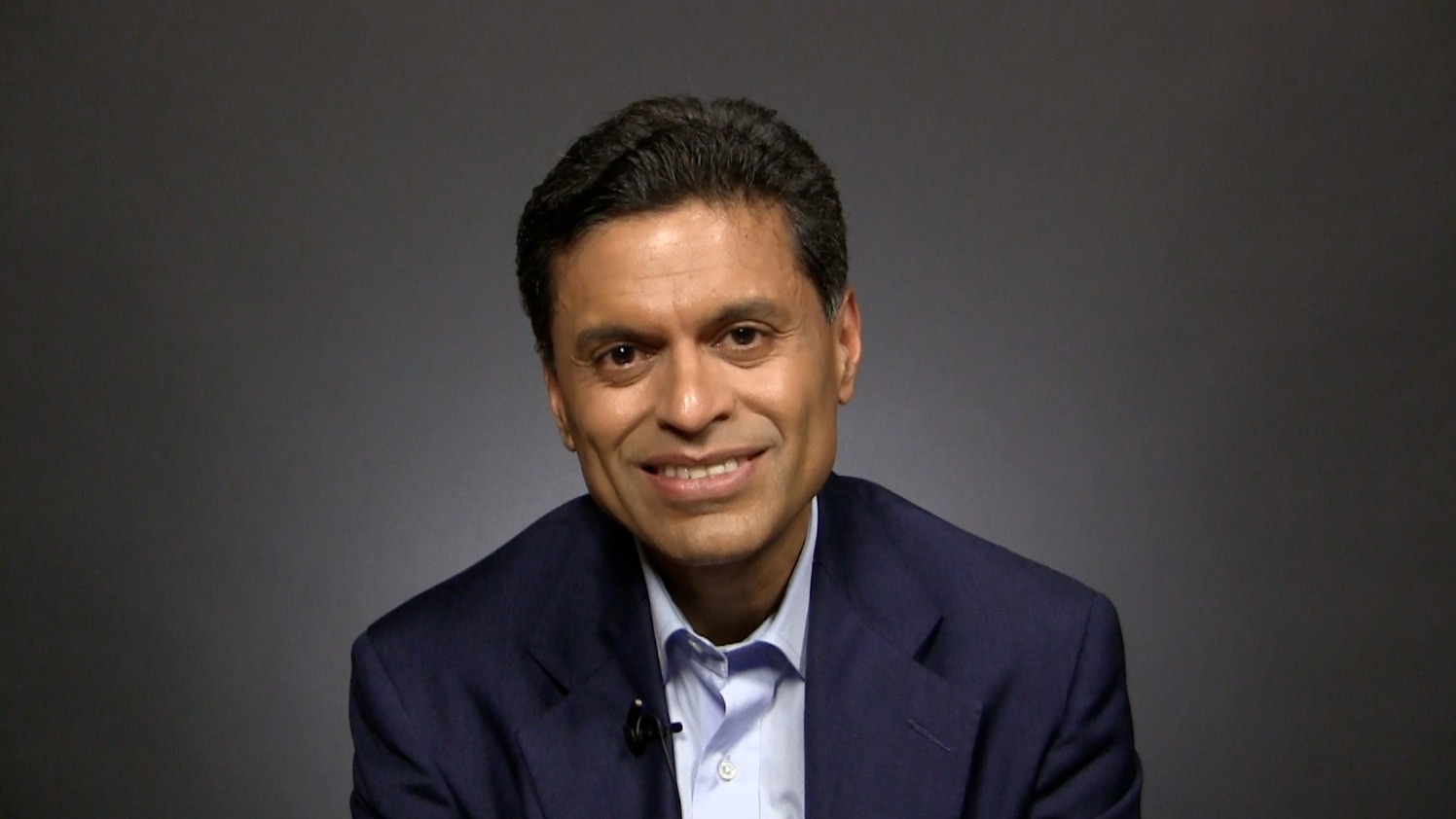Like a computer’s virtual rendering of himself as neoliberal consciousness-shaper of the hour, Fareed Zakaria returned triumphally yesterday to his “Yale family,” as his host at the Center for the Study of American Politics called it, and delivered a most excellent stump speech on the very important question, “Is the American Dream Dead?”
Forgiven and forgotten were minor but telling embarrassments such as Zakaria’s fleeting suspension by Time magazine and resignation from Yale’s governing corporation in 2012 after plagiarizing a New Yorker article by Yale Ph.D. Jill Lepore and delivering a commencement speech at Harvard that he’d recently delivered at Duke.
| The price of telling other apologists of the global corporate wrecking ball whatever they need to hear. |
So what? With his every hair in place and his virtually homespun quips perfectly timed, Zakaria at Yale on Wednesday offered yet another manifestation of himself as the $75,000-a-speech-giver at investment bank dinners, a Yale College graduate (1986), Harvard Ph.D., and member of the Council on Foreign Relations and the Trilateral Commission who nevertheless considers himself enough the democrat to to tell the masses, via CNN and Time, why the neoliberal dispensation is inexorable and, for all its disruptions, beneficent, and why public acquiescence in the judgments of its experts and most energetic players is warranted.
It’s all catnip to many at Yale, which is being transformed from the crucible of civic-republican leadership training and civil-society building that it’s been at its best into a career-networking center and cultural galleria for a global managerial elite that answers to no republican polity or moral code. Yale recently opened a new liberal-arts college as a joint venture with the national university of the glittering but authoritarian regime in Singapore that thinks and acts more like a global corporation than a republic. Zakaria energetically supported that miscarriage of liberal education.
In 2011 The New Republic called him one of Washington’s “Most Overrated Thinkers,” “a barometer in a good suit, a creature of establishment consensus, an exemplary spokesman for the always-evolving middle. He was for the Iraq war when almost everybody was for it, criticized it when almost everybody criticized it, and now is an active member of the ubiquitous ‘declining American power’ chorus.”
Now that that chorus is modulating its lines, so is Zakaria, who told his Yale audience that although nothing can halt certain kinds of decline in America—in middle-class public and private-sector jobs owing to computerization and globalization, and in American foreign-policy unilateralism and militarism (which he championed when George W. Bush was president and before a photographer caught candidate Barack Obama carrying Zakaria’s book The Post-American World onto a plane)—no other country is more “dynamic,” “resilient,” or better equipped than ours to reinvent itself and lead the world, all without inconveniencing the super-rich, for whom Zakaria remains an apologist in every season.
America, he said, should be “ecstatic” about the growth of its GDP, its proliferation of information-revolution companies, its demographic youthfulness and diversity in comparison with other developed countries, and its unmatched ability to lead in guiding a convergence of the global currents which we, after all, set in motion.
Drawn though I am to such optimism, I watched Zakaria’s rendering of it with some bemusement. I couldn’t help recalling his declinist wisdom in The Post-American World and in a talk to another Yale audience, in 2010, at the opening of the university’s $50-million neocon/neoliberal Jackson Institute for Global Affairs, a “parallel university,” somewhat beyond the Yale College faculty’s control, where “Professor” Stanley McChrystal teaches a course on “Leadership” and “Professor” David Brooks teaches one on “Humility.”
Interviewed on stage before a large audience by then-Yale President Richard Levin, a neoliberal economist and the new institute’s godfather, Zakaria announced that “A billion people now do jobs that American middle class and workers, blue and white collar, used to do,” adding that “Once, Americans had all the capital and the know-how” but that, now, other peoples “have the resources, and they know how.”
The audience in 2010 was silent in gloomy acquiescence. Zakaria claimed that not only must we be realistic about this—as indeed we must—but also that such capitalist disruptions of civil societies in a flat world where other nations are rising may be birth pangs of democracy. He didn’t note that in the U.S. those disruptions are causing something more like democracy’s dissolution.
Two years later, Levin would announce his own resignation shortly after Zakaria’s, amid vocal opposition to their energetic support for the Jackson Institute, Yale’s joint venture with Singapore and other manifestations of the corporatizing of liberal education. But by 2014, Zarkaria had changed his tune enough to buoy his new Yale audience with a cheery re-working of the same global events as harbingers of changes Americans can believe in, changes so rapid we have no time to be pessimistic about them and better reasons than any other developed nation to take advantage of them.
He didn’t mention that America’s impressive “growth” relies far too heavily on the production and marketing of consumption that feeds environmental destruction, obesity, lethal violence, and political and intellectual degradation. Instead he denounced bloated public-sector pensions and Medicaid projections, although these are most people’s reactions to the social irrationality and inequity of an economy into whose webs of corporate surveillance, groping, and indebtedness we are all being drawn.
He did mention briefly that many of the legislators who are ensnaring us or enabling private warlords to ensnare us have been bought and paid for by those corporations and their leaders: “Someone who pays $20,000 to have coffee with a congressman is buying an amendment to the tax code.” He also mentioned the need for public investment in nutrition and education for poor youngsters and infrastructure repair and implied we might pay for it by closing tax deductions such as those for second-home mortgages.
But that didn’t square with his claim that “social democracy” has already triumphed in the U.S. and that while it hasn’t brought the serfdom conservatives feared, we can’t afford to expand it. And he dodged questions about reconfiguring the over-financialized, consumer-bamboozling, socially degrading global wrecking ball that has brought us to this and that would have horrified Adam Smith and John Locke.
Zakaria manages thus to eat his cake yet keep it while he parses the movements of the naked emperors whose fatuity he drapes so deftly, and certainly nothing happened during his day at Yale to expose the monumental arrogance that sustains his public persona. But in a 2010 essay, “Fareed Zakaria’s Problem—and Ours,” I found him trying to cover a rare loss of his cool in an id-like eruption against the political psychologist (and one-time student of mine) Drew Westen, who’d written a prophetic, potentially game-changing New York Times essay, “What Happened to Obama’s Passion?”
Zakaria, a leader of the palace guard of neoliberal pundits, lost no time disparaging Westen, and moralistic “liberals” generally, for daring to ask why Obama had stopped telling Americans the truth about what’s being done to them. When Charlie Rose hosted both men on his show and Westen showed he knows a lot about the political constraints facing Obama, Zakaria retorted, “I’m not going to get into the what-ifs of a professor, you know, who has never run for dogcatcher advising one of the most skilful politicians in the country.”
As Rose noted that Zakaria has never run for dogcatcher, either, the outburst, like the 13th chime of a clock, cast doubt on Zakaria’s previous 12 chimes as time-keeper for the orchestra of high-minded opinion. Reading his CNN blog 48 hours later, I saw that he’d penned a long, middle-of-the night account of the Rose show debate, omitting his outburst and the truths from Westen that had provoked it. This “editing” foreshadowed Zakaria’s fast-and-loose handling of the Jill Lepore’s New Yorker article and his own commencement orations.
He’ll go on telling other apologists of the global corporate wrecking ball whatever they need to hear to make them feel more comfortable, assessing our neoliberal dispensation’s costs, benefits, and opportunities for democratic mitigation in the style of a grand-strategic memo-writer, his rat-a-tat-tat diction issuing in firm, clear judgments graced with felicitous apercus. If he rests, it’s because he’s disarmed all intellectual and moral resistance, at least for the moment, as he did at Yale.
Jim Sleeper, a writer and teacher on American civic culture and politics and a lecturer in political science at Yale, is the author of The Closest of Strangers: Liberalism and the Politics of Race in New York and Liberal Racism.







0 Comments